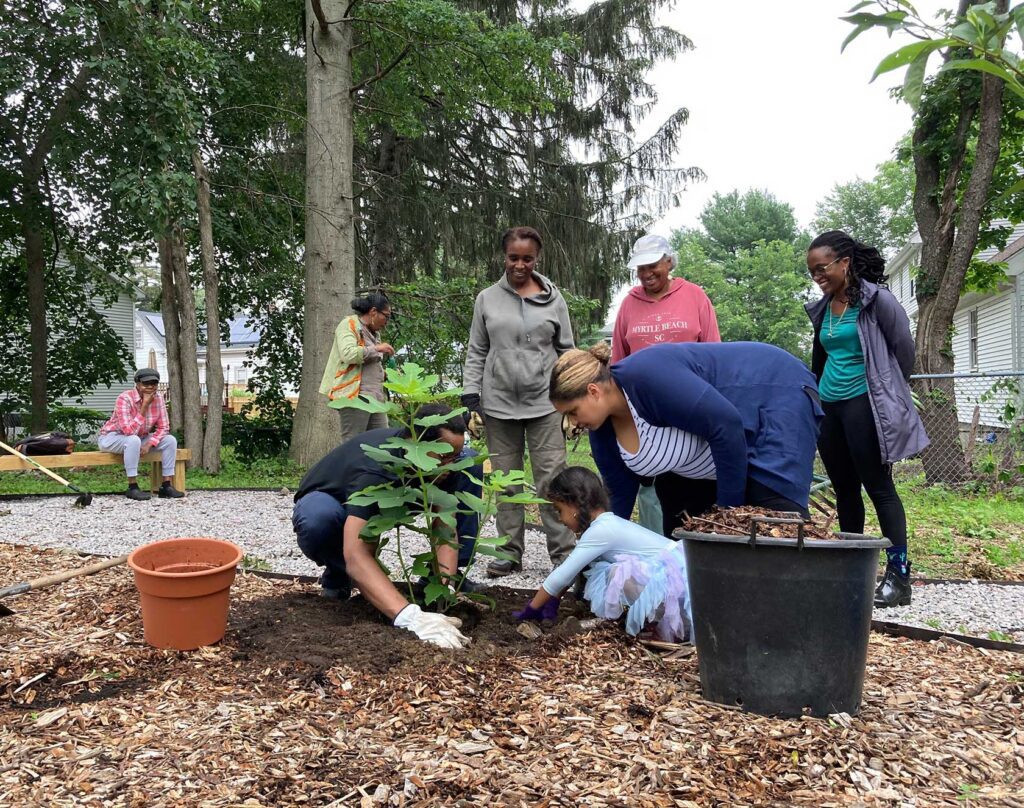City’s community garden program supports fresh food, environmental benefits

As a child, Jessie Dambreville would look out her window at an open lot next door, near the Neponset River in Mattapan. Full of weeds and walnut trees, the space sat empty for years, serving mostly as a shortcut home.
Now, under her stewardship and with support from a city program aimed at developing urban farms and community gardens, the space is growing as a food forest, with fruit trees and other plants that, once mature, will help feed the community.
“It was just this wasted space that I could see could be a beautiful space,” Dambreville said.
The Boston Food Forest Coalition obtained the land for Dambreville’s Edgewater Food Forest through the city’s Grassroots Open Space Program, a municipal effort that provides open land and funding to support the creation and development of community gardens, urban farms and food forests in the city. The program, directed at low- and moderate-income neighborhoods, opened its annual applications for funding this month.
“The Grassroots Program … is really supporting the city’s vision for a more resilient, a more healthy and more connected city,” said Theresa Strachila, who manages the Grassroots initiative.
Goals for how much food an individual project can produce vary. The program doesn’t aim to feed the whole city — food from a community garden can only go so far — but the spaces can mean increased access to healthy foods for individuals and families, as well as broader impacts like building community connection and resilience, said Strachila, who uses they/them pronouns.
“The city and food consumption is a part of a complex and really big food system, and we need a lot of food,” they said. “We definitely can’t grow all of that food in the city, but for individuals and families, access to a growing space can help to decrease food costs in the growing season, especially for fresh produce, and can also increase the quality of the food that folks are able to consume.”

Aerial shot of Ellington Street Community Food Forest Garden, Dorchester. PHOTO: Boston Food Forest Coalition
The spaces also offer a place for people to meet their neighbors or create opportunities for intergenerational learning, said Jordan Takvorian, stewardship manager for the Boston Community Gardens Program, run through the Trustees of Reservations, which operates 56 gardens across eight of Boston’s neighborhoods.
“Maybe a grandmother is teaching a younger person how to garden, or what a butterfly is,” he said.
Since its creation, the Edgewater Food Forest in Mattapan has served as a community gathering spot, hosting Halloween and Christmas events as well as movie nights.
And though city food needs extend beyond what community gardens can provide, Takvorian said the reach they can have shouldn’t be underestimated. He said there are families growing and harvesting produce for long-term use.
“There are some really productive plots where people are canning and preserving, and you can just tell this is a food they’re going to be eating all winter long,” Takvorian said.
In Mattapan, once the plants in the Edgewater Food Forest are mature, Dambreville said she expects the space might generate more produce than the community can use.
The city’s Grassroots Program is a key source of funding for this type of community development, said Takvorian.
“There’s really no other capital funding that’s coming in for these kinds of projects,” he said. “I think the funding from Grassroots has really touched every major project that we’ve done over the last 20 years.”
In addition to providing the land for the Edgewater Food Forest in 2021, the Grassroots Program also provided $125,000 to support initial construction. The Food Forest Coalition also received approximately $104,000 in 2022 Community Preservation Act funding to support further site improvements.
The program also aims to reduce impacts from climate change in the communities where gardens are built. The city is still developing specific goals around climate impacts through the program — which Strachila said started 30 years ago, before climate change was as big a concern — but it offers a chance for the city to consider not just how these spaces impact communities and their food access, but also the neighborhood more broadly.
“As we’re more aware of how vulnerable as a coastal city and as an urban area we are to increased heat events and flooding, thinking about the many different projects and programs the city has that are having an impact is really important,” they said.
Through green space and more permeable surfaces, the spaces can translate into reduced urban heat and reduced flooding.
“It’s keeping a plot of land green and not another source of asphalt,” Takvorian said.
The program also offers the chance to educate people around the value of shifting food systems to operate more locally. Strachila said more local food production limits the environmental impacts of food production and avoids breakdowns in transportation chains that were highlighted by the COVID-19 pandemic, while also supporting local industry.
“By connecting more people with their food, I think we help to build a movement of thoughtful food consumers and eaters, folks who are starting to go more often to farmers markets and support the local farmers in our in our state and in our region,” Strachila said.







